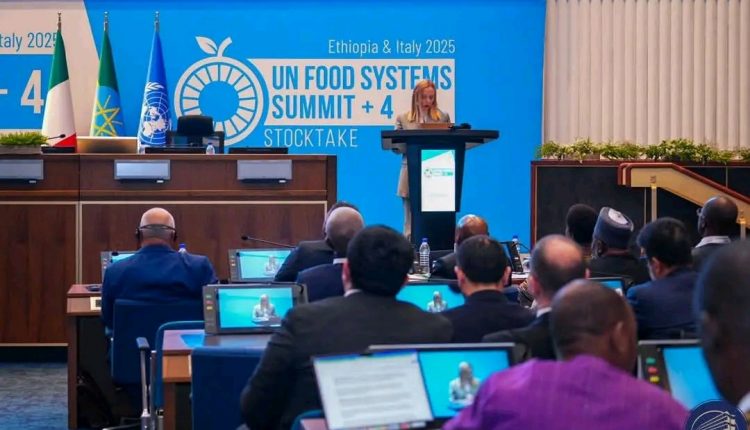Italian PM Highlights Africa’s Right to Food Sovereignty and Self-Determined Production
Addis Ababa, July 28, 2025 (FMC) — Italian Prime Minister Giorgia Meloni has underscored Africa’s fundamental right to food sovereignty and self-determined agricultural production as key to addressing the persistent global challenge of food insecurity.
Speaking at the opening of the Second United Nations Food Systems Summit Stocktaking Moment (UNFSS+4) held in Addis Ababa—the first time the Summit has taken place on African soil—Meloni emphasized the importance of involving the African continent as a central actor in international efforts to reshape global food systems.
“We chose to co-organize this event in Addis Ababa with the Ethiopian government not only because Italy shares a special relationship with Ethiopia based on concrete cooperation, but because it is essential for Africa to be a protagonist in the decisions and actions of the international community,” she said.
The Prime Minister highlighted that despite significant progress over the past seven decades, roughly 10 percent of the world’s population remains food insecure, with the burden disproportionately borne by Africa, where one in five people suffers from hunger and lacks access to sufficient, safe, and nutritious food.
“This already complex reality has been aggravated by recent global crises, including the economic fallout from the COVID-19 pandemic and the Russia–Ukraine war, which have disrupted markets, destabilized energy supplies, and fueled inflation that particularly affects vulnerable nations in the Global South and Africa,” Meloni said.
She warned of the dire consequences when populations lose access to food or the means to produce it, noting that this fuels poverty, intensifies conflicts, and increases vulnerability to violence, terrorism, and forced migration.
Framing food insecurity as not only a humanitarian concern but also a political and economic challenge, Meloni cautioned against viewing food systems solely through the lens of poverty and suffering.
“Food systems are engines of economic growth and development, both for fragile nations and for those with more robust economies,” she said, stressing the need for resilient production and distribution chains that enable communities to market their products, generate employment, and foster lasting growth.
Central to Italy’s approach is supporting Africa’s self-reliance and food sovereignty rather than fostering dependency. Meloni described food sovereignty as the right of communities to define their own food production models based on their cultural identity and local realities.
“Food sovereignty means resisting the standardization of food production that lowers quality and concentrates wealth. It means investing in local, high-quality products and empowering small and medium-sized farmers, who are the backbone of agricultural and environmental systems,” she said.
Italy’s commitment to this vision is embodied in the Mattei Plan for Africa, which leverages Italy’s unique expertise blending tradition and innovation in the agri-food sector. The plan has led to public-private partnerships that attract investment and deliver tangible results across the continent.
As an example, Meloni cited ongoing efforts in Algeria to reclaim over 36,000 hectares of desert for agricultural production, projected to yield up to 45,000 tons of cereals and legumes annually, create 6,000 jobs, and benefit more than 600,000 people.
Similar initiatives are underway in Senegal, Ghana, and the Republic of Congo, with plans to expand to Côte d’Ivoire and Kenya. Italy is also supporting projects in Tunisia to enhance water management—an increasingly critical resource facing geopolitical and sovereignty challenges.
“Our goal is to support self-reliance,” Meloni affirmed. “Small and medium-sized farmers and their families must be given the means to live with dignity and receive fair recognition for their vital work.”

